|

The Swinging Spotlight
DAVID WILKINS experiences
Tchaikovsky's 'Eugene Onegin' in Budapest
Perhaps it's only if you admit to how much you were looking forward to a production that you can begin to be objective about whatever disappointments you felt. On the basis of previous visits to Budapest and Amsterdam to see thought-provoking, sometimes startling, always emotionally engaging realisations by director Balázs Kovalik, my expectations were high. I didn't expect his take on Eugene Onegin to be anything like the Tcherniakov production that I saw on the Bolshoi New Stage last year because Hungary has no reason to feel the particular sense of ownership and tradition of this piece that Russia does. Hooray, probably, to that! But -- indulge me for a moment, please, if I reduce my initial response to a simple complaint: 'Oops -- no samovar!' Then I'll try to explain why I guess it will be a production to tease and haunt for a long, long time.
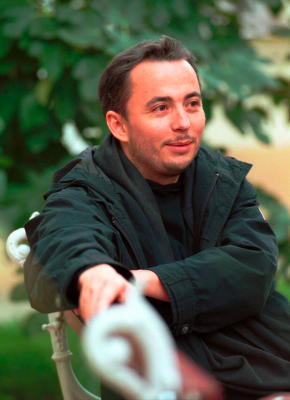
Balázs Kovalik, Artistic Director of the Hungarian State Opera since July 2007
|
Actually -- there's no need of a literal samovar. What I suspect the opera will always need, however, is a sense of the society from which its tragedy emerges. Unrequited love, adolescent passion and naivety, caddish behaviour, flirtation and jealousy, bad-choices (free will) and fate (no choice) are subjects for all art and all times. Tchaikovsky seems to suggest that he didn't think his opera would achieve any kind of success until its reputation spread outwards -- from those who could identify with Pushkin's nervous landowners and their peasant workers towards the grandees of the St Petersburg balls. From Act One to Act Three, effectively. Stanislavsky -- who loved Chekhov with appropriate abandon but, also, careful societal analysis -- mounted a production at the Moscow Opera Studio in 1922 that has remained the basis of Bolshoi productions of Onegin. It's as close to Chekhovian ambiguity as any attempt to fuse the comedy and tragedy of The Seagull, The Cherry Orchard or Uncle Vanya. It may, or not, serve tea in a particular way but, wow, is it Russian! For me, it's all the better for that.
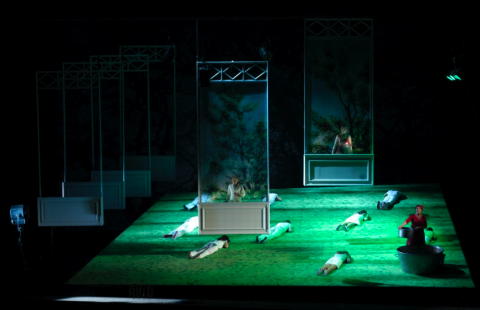
The opening scene, with Tatyana (Eva Bátori) and Olga mounted on swinging panels. Annamária Kovacs (bottom right) as the maid Filipyevna. Photo © 2008 Vera Éder
|
Kovalik chooses to concern himself with the universal more than the geographical particular. He points to that 'moment in the spotlight' (a metaphor made, effectively, literal on stage) when love comes, be it active or passive, to a character and which necessitates a questioning of self-esteem and courage, involvement, evasion or any combination thereof. As his characters stare and sing into a visible spotlight, they are asking a pretty fundamental question: 'It's my moment -- what am I to make of it?' Pushkin had a lighter touch with such matters and many more stanzas than the composer allowed himself. Tchaikovsky, Fate-obsessed as he was, fleeing from a disastrous marriage as he was, self-loathing in some ways but trying to commit to sexually romantic passion and its visceral pains knew something of both self-examination and self-delusion. In many different ways, it's the triumph of this production that it hits that note -- vibrating towards a discord -- so apposite to so many characters who wonder about chances won or lost and the value of their stoical response (or excuse?) : 'God sends us habit from above / In place of happiness and love / That proverb's true ...' Do Pushkin, Tchaikovsky or Kovalik want us to believe that? If only dear old Frankie Howard could have managed the part of Monsieur Triquet, I'd have joined him in a chorus of 'thrice nay ...!!' But the opera leaves me more uncertain than that. The acceptance of what might appear to be second-best is everywhere. Larina and Filipjevna (I'll use the Hungarian form for characters throughout) admit to marriages that weren't what youth's young dream was made of and Tatjana will not, for reasons of honour rather than expediency, cheat on her loyalty to Gremin. Henry James, who fretted about treachery his whole life through, would have approved and he, too, would have seen the tragedy in the plight of Olga and Lenskij (Lensky). I can certainly imagine him swirling brandy in a glass as he contemplated the homosexual implications in the friendship of Lenskij and Onegin. The discreetly suicidal choice that Lenskij makes in not participating in the duel is the very stuff -- (what is the figure in the carpet?) -- of one of James' equivocal tales. All of this emerges from Kovalik's production and it will, quite appropriately, stew in the brain.
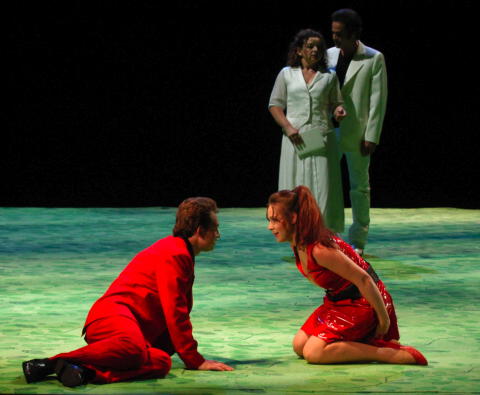
Two couples with doomed futures: Tatyana and Onegin hover (in white, rear) while Lensky and Olga bicker and flirt (first cast). Photo © 2008 Vera Éder
|
Budapest was Mahler's opera house for a time. As it happens, Mahler conducted the Hamburg première of Onegin in 1892. 2008 Budapest weren't so lucky, alas. For the 3 June performance, conductor János Kovács -- who had made something exciting of the first Act -- became indisposed and was replaced by László Bartal who conducted for the remainder of that evening and subsequent performances. His tempi were tighter but there was never anything authentic about the orchestral sound -- when Tchaikovsky sounds like Verdi on a routine evening it's not the composer's fault! The woodwinds made a pleasant sound in their solos but the strings never really acknowledged what depths of pain and bitterness they were required to bite into. I kept thinking that Georg Solti -- a student here and, later, a great conductor of Onegin -- would have had plenty reason to be the 'screaming skull' of his frightening reputation. There really isn't much excuse for this type of orchestral laziness and one can only wish Balázs Kovalik well for his new relationship with Ádám Fischer.
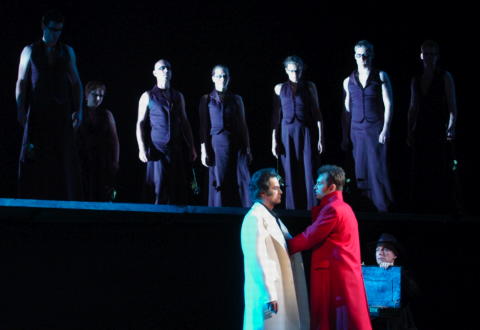
Things begin to go wrong ... Onegin (András Káldi Kiss) and Lensky (Attila Fekete) square up, whilst the eerie and ominous Fates look on. Photo © 2008 Vera Éder
|
The cast were, largely, very persuasive. Viktória Mester was as coquettish an Olga as you might want to see or hear. She was, completely, a team-player in ensemble numbers from the very beginning where her phrasing in the plaintive duet with Tatjana somewhat shamed her elder sister. The blindfold taunts with Lenskij established genuine tension in the psychodrama of relationships -- this was vocally and theatrically a Carmen more than in-the-making! But -- hey (ambition on hold), she recognised what a big role Olga is and seemed at-home in that!
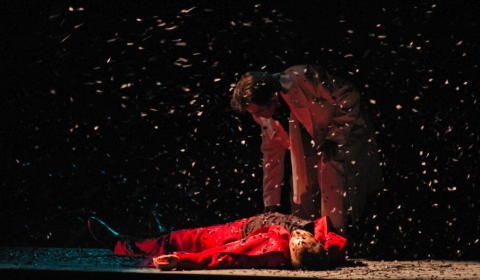
The inevitable result. Lensky lies dead, having courted death (in a snowstorm) at the hands of his erstwhile closest friend. Photo © 2008 Vera Éder
|
Éva Balatoni as Larina and Annamária Kovács as the nursemaid, Filipjevna, managed to carry the ethos of older-world Russia in singing their parts -- that is the glory that Tchaikovsky has given to them and they did him proud. It's entirely to their credit that they also managed to embody credible characters in a production that made it a little hard to locate their roles in a recognisably hierarchical society.
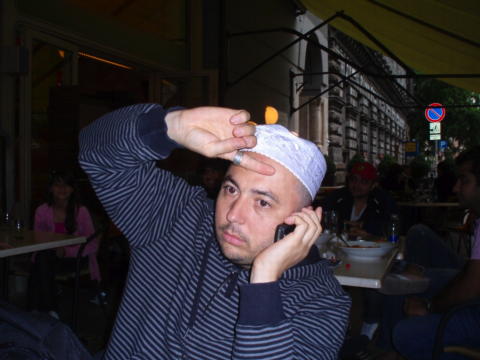
Balázs Kovalik. Photo © Roderic Dunnett
|
Attila Fekete was a Lenskij of which dreams are made: quixotic and volatile as well as tender and vulnerable in his acting; intimately restrained or passionately outraged in his singing; an inevitable showstopper in his final aria. Stardom ought to beckon for him.
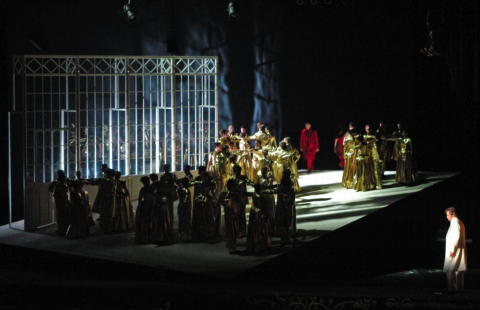
Still clad in symbolic blood-red, Lensky's ghost (Attila Fekete) appears, Banquo-like, to haunt his erstwhile friend and killer, Onegin (right). Photo © 2008 Vera Éder
|
Péter Fried is a known wonder and he didn't disappoint in his delivery of Gremin's austere but entirely humane, honest, polite and luck-acknowledging Act Three aria.
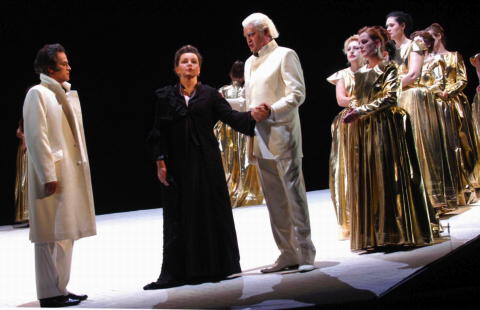
The first cast - András Káldi Kiss (Onegin) with Eva Bátori (Tatyana) and Peter Fried (Gremin). Photo © 2008 Vera Éder
|
Éva Bátori navigated a veritable 'Here-be-Monsters!' chart as Tatjana in her Letter Scene. It's so amazingly difficult a role to make complete and sympathetic throughout -- I've always wondered whether the composer's homosexuality inhibited him here (?) -- and there was a good impersonation of languid sentimentality, jittery flirtation, social unease, infatuation and 'youthish' despair at rejection. I suspect it needs to be said that, on the night I attended, not quite enough of the passion and the pain were delivered and, if Tatjana is meant to be about seventeen years old at the beginning, I couldn't buy that for a moment. There was a much better sense of sacrifice in Act Three where the voice matched the advanced age and, cumulatively, I found her performance met a lot of the demands of what must be amongst the most challenging parts in the repertoire.
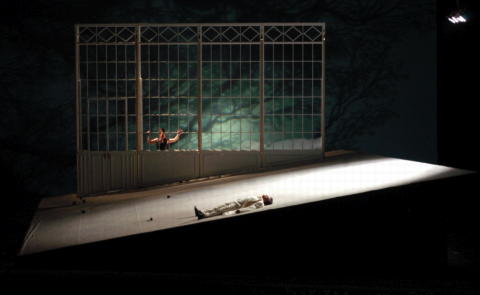
A disastrous lack of communication mixed with a moral deficiency - András Káldi Kiss' Onegin fails to make touch with Eva Bátori (Tatyana). Photo © 2008 Vera Éder
|
András Káldi Kiss was an Onegin on a mission that I didn't really understand. Of course, the character is a self-absorbed nonentity with ideas above his station that are, eventually, reduced to the reality of dissipated alienation. I'm not sure, though, that that means he has to swallow his lines and music from the very offset and present a personage of such vacuity that a fellow picnic-flask on heat might want to reject him. Nothing about his projection or singing could have justified Tatjana's love. Was that Kovalik's point? Silly, silly girl -- completely besotted by Romantic tales garnered from books and unable to recognise the hollowness beneath the flesh? If so, it might have been a great idea if we'd been given more cause to think him, even ironically, worthy of having an iconic novel/poem and opera named for him. As it was -- one just thought not only 'no Samovar' but no personality, no acting skills and, sadly, not much voice. Which I suspect to be an insult to this singer -- so, all I should say is that I didn't begin to comprehend how this character was being directed and that, may well, be my loss!
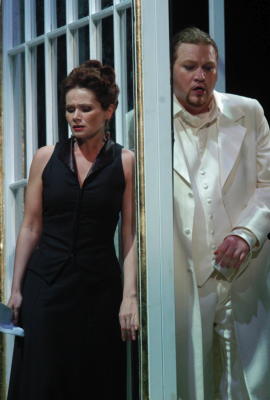
No connection. Frankó Tünde and Levente Molnár, the second cast pairing in the final act of Balázs Kovalik's Budapest staging. Photo © 2008 Vera Éder
|
I loved the lighting as the three Acts proceeded! Green was pastoral, Red was passionate, Gold was plutocratic. Black flowers spoke their own destiny of frustration or worse (metaphorical or literal death ...) I loved the dancing which, on a familiar Kovalik ramp, was more in the fun than the fruition (a real challenge to the cast and chorus) but a joy to watch. I was intrigued by little motifs of jam and cherries and the book-lovers who, having been rejected and vilified at the start, became pursuing Fates. Much to ponder, as always.
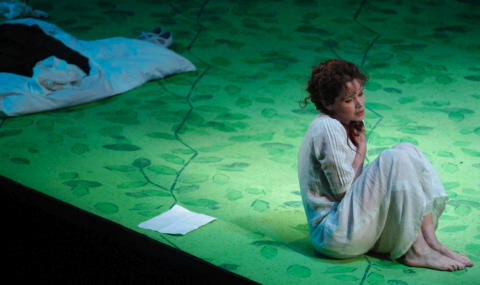
Frankó Tünde, the second cast Tatyana, in the letter scene. Photo © 2008 Vera Éder
|
And that's why it's a production that will haunt me. The very Chekhovian production at the Bolshoi was tremendously satisfying but left few, if any, questions. That was life -- 'then' and 'there' and I liked that -- it really worked. The Budapest production asks a little more about the continuing enigma of life's choices and what we might do with those moments when the swinging spotlight invites a destiny that could so easily spell defeat.
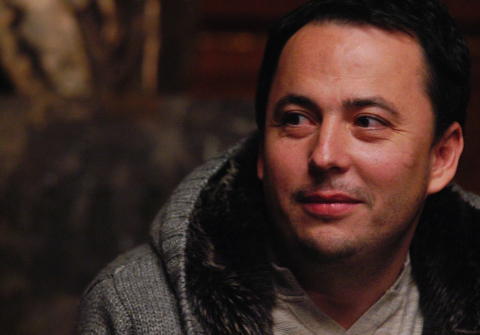
Balázs Kovalik, pleased with the result. Photo © Vera Éder
|
Copyright © 2 October 2008
David Wilkins, Eastbourne UK

Eugene Onegin, conducted by János Kovács, will be revived on 21, 28 and 31 January, 4, 14 and 27 February and 1 March 2009. Balázs Kovalik's new staging of Beethoven's Fidelio, conducted by the Hungarian State Opera's Music Director Ádám Fischer, with Thomas Moser as Florestan and Evelyn Herlitzius as Leonora, opens on Sunday 5 October 2008 and runs on 7, 10, 11 (second cast première), 16, 30 October and 2 November 2008, then 14, 17 and 26 April 2009. Gyorgy Ranki's colourful children's opera Pomádé király új ruhája ('The King's New Clothes') runs from 4 October to 20 November 2008 and between 1 February and 31 May 2009. Kovalik's radical Budapest staging of Strauss' Elektra, with János Kovács conducting, will be revived on 24-25 October and 5, 6, 8 and 9 November 2008, with Ádám Fischer and Péter Oberfrank conducting. Oberfrank will be chief conductor for Kovalik's revival of Puccini's Turandot on 9, 12 and 23 December 2008, then 22 March to 3 May 2009. Handel's Xerxes, a new production directed by Balázs Kovalik and conducted by Ádám Fischer, with Andrea Meláth in the title role, will open on 30 April 2009, with the second cast première on 15 May, and will run to 27 May 2009. The Hungarian State Opera's new season continues to 17 June 2009. |
HUNGARIAN PREMIERE OF MAXWELL DAVIES' 'RESURRECTION'
'PETER GRIMES' AT HUNGARIAN STATE OPERA
|

